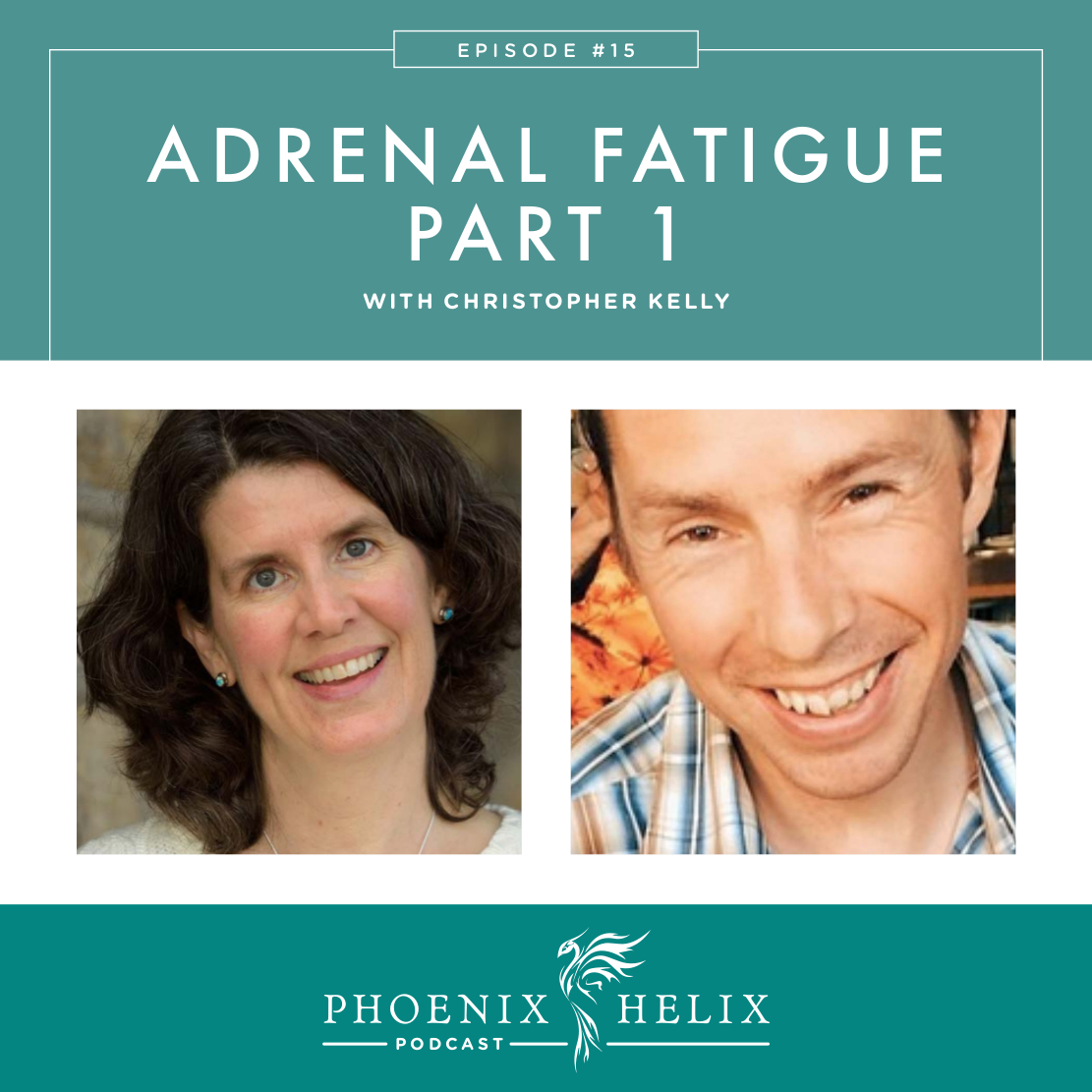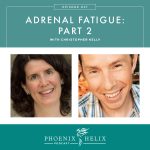Tired and Wired
Do you feel tired during the day, but find it hard to fall asleep or stay asleep at night? Have you lost all of your motivation and desire to do the things you used to call fun? Do you simply feel exhausted, like you can’t replenish or recover? You might be suffering from adrenal fatigue, which often accompanies autoimmune disease.
Today, I’m joined by Christopher Kelly, co-owner of the functional medicine practice, Nourish Balance Thrive. He has recovered from adrenal fatigue himself and helped hundreds of others do the same. If the photo below gets you curious, he’s also a proud father and professional mountain biker.
Adrenal Fatigue Update
In 2016, Chris Kelly returned to the podcast with a new perspective on adrenal fatigue, and a new test that he believes is more accurate. Check out Episode 47 for Adrenal Fatigue: Part 2.
Listen to the Show
- Subscribe to my podcast through your favorite podcast app: iTunes, Stitcher, Google, TuneIn, Spotify, Amazon, etc.
- You can also listen to the episode right here through the player below, and if you subscribe to my newsletter you’ll get notified of future episodes.
Podcast: Play in new window | Download
Show Notes
- Intro (0:00)
- Meet Christopher (0:57)
- Co-owner of functional medicine practice: Nourish Balance Thrive.
- Professional mountain biker
- Father
- He’s recovered from adrenal fatigue himself and has helped hundreds of others do the same.
- What is Adrenal Fatigue? (9:56)
- Mainstream medicine doesn’t take it seriously.
- There are various theories on what causes adrenal fatigue symptoms. Christopher believes it’s not actually a problem with the adrenal glands themselves. Rather, inflammation in the gut affects the part of the brain that asks the adrenals to release cortisol, and can throw the system out of balance.
- The diagnostic test is a saliva test, which measures cortisol, DHEA and other hormones throughout the day. In healthy people, cortisol is highest in the morning and lowest at night. In people with adrenal fatigue, it’s either the opposite of that, or erratic throughout the day. DHEA is often low in people with autoimmunity, and always low in people with adrenal fatigue.
- What Are the Symptoms? (17:29)
- Fatigue all the time, but especially in the afternoon.
- Waking up in the middle of the night and having difficulty getting back to sleep.
- Total lack of motivation to do anything.
- Mild depression.
- Dizziness going from sitting to standing.
- How Do You Treat It? (22:52)
- Foundation is the Paleo Autoimmune Protocol.
- Rest is essential. Address difficulty sleeping by balancing circadian rhythms.
- Take a hiatus from strenuous exercise. Gentle exercise is OK – walking is very beneficial.
- Supplements (only effective when diet and lifestyle are being addressed), and prescribed based on lab test results.
- Success Story Case Studies (31:11)
- Maria was a 49 year-old runner with intense fatigue, hair loss and digestive issues. Her saliva test showed very low cortisol, estrogen, progesterone, testosterone, melatonin and DHEA. This is typical for people adrenal fatigue. Her stool test showed a parasite infection, which they treated with herbal antibiotics. They coached her on diet and lifestyle changes as well. Results: infection cleared, her symptoms went away, hormones balanced, and she was able to enjoy running again.
- Chris has more case studies on his website.
- Christopher’s Top 3 Recommended Tests (43:42)
BioHealth’s Adrenal Stress Profile Saliva Test. Update 2016: Chris now recommends the DUTCH test for adrenal function.- A Comprehensive Stool Analysis.
- Great Plains Urine Organic Acids Test.
- Supplement Recommendations (44:33)
- DHEA, Pregnenolone and Licorice Root drops, delivered sublingually (underneath the tongue). Very small doses have a potent effect. Christopher prescribes dosage based on saliva test results. Note: Licorice root is contraindicated for people with high blood pressure.
- Food Recommendations (47:55)
- Keep your blood sugar stable. You can buy a fingerstick test kit and measure your own. If you drop below 60, your body will release cortisol to raise the glucose, so you don’t want to drop that low. Eat less carbs and more healthy fats to maintain healthy levels.
- Tips for a Good Night’s Sleep (52:02)
- Change you habits to support healthy circadian rhythms.
- Supplements that can be helpful: 5-HTP, and B6 . He looks at urine organic acid tests results to see which people need.
- Exercise Recommendations for Athletes with Adrenal Fatigue (56:22)
- It’s time for an “off season” to focus on healing. It’s not forever, but it is necessary for now.
- If you’ve tried all the diet and lifestyle interventions and still can’t do the exercise you love, it’s time to do some lab tests to find potential underlying problems.
- Outro (58:47)
- Be sure and listen to Podcast Episode 47 for an Adrenal Fatigue Update. Christopher Kelly works with people worldwide via Skype. He also hosts two podcasts: Nourish Balance Thrive Paleo Baby. His website is Nourishbalancethrive.com.
- Eileen (your podcast host) is the author of multiple books, written to help people thrive with autoimmune disease. Learn more on the Books Page.
- If you like this podcast, follow or subscribe through your favorite podcast app. You can also subscribe to Eileen’s biweekly newsletter.
- Check out the entire archive of podcast episodes.
You May Also Be Interested In
Spreading the Word
If you like the podcast, please leave a positive review in iTunes. It would mean the world to me, and also helps others find the podcast. Here are some quick instructions using your iPhone:
- If you are already subscribed to my podcast: (1) Click the purple podcast icon. (2) At the bottom of the screen, click Library. (3) At the top of the screen, click Shows. (4) Click the Phoenix Helix podcast image. (5) Scroll down the page, and you’ll see Ratings and Reviews. Scroll down a little bit more and click on Write a Review. This will bring up the review screen. Tap 5 stars (if you love the podcast), and then click in the title box, and it will bring up the keyboard. Enter a title and short review. (6) Click Send in the upper right corner. (7) Thank you! Positive reviews give the podcast a higher search ranking in iTunes, helping people find it and letting them know it’s a quality podcast and worth their time to listen.
- If you haven’t subscribed to my podcast: (1) Click the purple podcast icon. (2) In the lower right corner, click the magnifying class. (3) Type Phoenix Helix in the search box. (4) Click the podcast cover in the Show list. (5) If you’d like to subscribe, click the + sign at the top of the screen. (6) To write a review, scroll down the page, and you’ll see Ratings and Reviews. Scroll down a little bit more and click on Write a Review. This will bring up the review screen. Tap 5 stars (if you love the podcast), and then click in the title box, and it will bring up the keyboard. Enter a title and short review. (7) Click Send in the upper right corner. (8) Thank you! Positive reviews give the podcast a higher search ranking in iTunes, helping people find it and letting them know it’s a quality podcast and worth their time to listen.










Hi
Is there evidence that Willis-Ekborn disease may have triggered mood disorders in puberty.My female family members are genetically predisposed to Restless Legs and a few of us have developed anxiety and depression afterwards.
Kind regards
Hi Diane. Neither Chris nor I are qualified to answer this question. I recommend searching Pubmed to see if any studies have been done on that connection. I will say that very few health problems exist in isolation. Our bodies are holistic systems where everything connects in some way.
We had a discussion about Adrenal Fatigue on my Facebook page, and one reader who recently recovered had some beautiful advice I’d like to share:
“i think three things are most important: 1. you will want it to get fixed fast, which is understandable, but not realistic. you have to remind yourself that you’re not looking for a quick fix that might have you falling apart again after a short time; you want to actually heal yourself from it so that you can really live your life afterwards and not be afraid of tipping back into adrenal fatigue. 2. this means that when you finally start feeling better, it does not mean it’s over. celebrate the improvement and enjoy the feeling that what you are doing is working, but don’t take it as permission to stay up late or overdo it or otherwise be hard on your body. improvement will be gradual, coming in fits and spurts. if you keep at it, you will feel even better, and eventually you will feel even better than that. 3. if your adrenal fatigue is severe, as mine was, it might take a while before you notice ANY improvement. this will make it hard to believe in what you’re doing, but if you get good at listening to very subtle signals your body is sending you, you will start to notice tiny improvements. and those tiny improvements can give you hope. it does get easier as you go.” ~ Stephanie